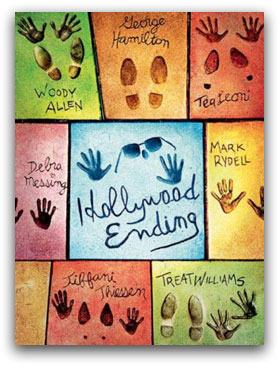
Hollywood Ending
Woody Allen, director
Review by Rada Djurica
It's hard to believe this movie was made by the same man who usually
stars in his films. Who financed this? The work is unambitious and dull.
Maybe this is an attempt to make something different. Perhaps it's the
fact that he can relate so well with his main character. This one is just
another Woody Allen plot-deprived random comedy. It is hard to distinguish
one from the other. However, there's slight news here. This film might
be his bitterest work.
This time, Woody is a temperamental, Oscar-winning movie director, reduced
to making TV commercials in the Canadian tundra. One day he unexpectedly
finds that his ex-wife arranged with her studio boss, now her fiancé,
to hire him to direct his new $60 million dollar picture, The City
that Never Sleeps. As usual, a neurotic and psychosomatic character,
he goes temporarily blind. And blind as he is, he keeps on directing the
film. The film industry people are so stupid they do not notice his blindness.
His trusted agent, Mark, tells him to tell no one, because if the financier
ever finds out, he'll never work in the industry again. Maybe this is
something that should happen after all.
This is a New York film, which offers a familiar subject to Woody, perfect
for him to direct. Here, we see the same old alter ego, performing as
a neurotic, psychosomatic, pill-popping, insecure womanizer. Oh, vanity!
He is ridiculously cast in the leading role next to a young woman, half
of his age. This Woody formula apparently has become far too predictable.
Maybe because Woody Allen really enjoys it. We can all see that this comedy
is mechanical and uninspired. What's the point of making the film in the
first place than? I guess that is something we should ask the director
himself.
Woody expresses contempt for everyone but himself: film critics, the movie
public, the French taste in cinema, the Hollywood lifestyle and almost
everything else. Why? Why is this man making fun of Hollywood, since he
belongs to this world?
The supporting cast is unimpressive. No one to remember.
The film's subtext: Allen's love-hate relationship with the picture industry
or, rather, his love for the industry and his hatred for the movie business.
If this is movie industry parody, which is a cliche, it's also beneath
a filmmaker such as himself. But it turns out to be, as well, something
of a parody of his self-centeredness. Typical is a scene where someone
ends a conversation by saying, "I've gotta run; I'm having a skin
cancer removed."
The film does include some profanity and sex talk, and it's not interesting for children and teenagers.
Much of the success of Hollywood Ending has to do with the fact that Allen and Tea Leoni work so well together. Their verbal sparring is amusing and seems believable, with at least one memorable gag to make you laugh. For Woody's fans, even this is enough.